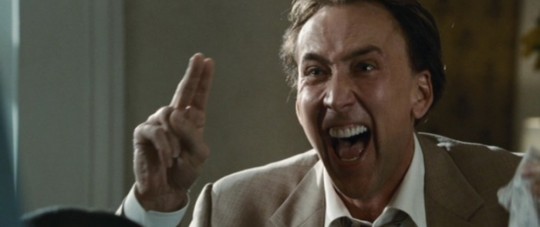From Script to Screen: The Strange Alchemy of ‘Bad Lieutenant: Port of Call New Orleans’ by Soheil Rezayazdi
By Yasmina Tawil
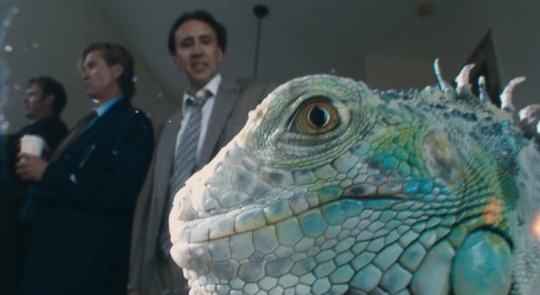
The word “iguana” doesn’t appear in the shooting script of Bad Lieutenant: Port of Call New Orleans. And why should it? Written by veteran TV writer William Finkelstein, the script unfolds with the cause-and-effect logic of a tight police procedural. Prior to penning Bad Lieutenant, Finkelstein wrote more than 50 episodes of L.A. Law, created and wrote on Brooklyn South, and contributed to such cop show staples as Law & Order and NYPD Blue. The man knows how to write a coherent crime drama. He’s devoted his career to the genre, mastering its plot points and character arcs for network television.
So why, in Bad Lieutenant, does a routine scene of police surveillance devolve into a full minute of shaky close-ups of iguanas? Why do scenes end with mystifying non-sequiturs like “Shoot him again…his soul is still dancing”? Why does its protagonist enter a bar shouting, “Sup! Sup! Sup, motherfucker!” for no reason? And why does he aim a gun at an old lady’s head and seethe “Maybe you should drop dead, you selfish cunt!” long after a director should have shouted “cut”?
William Finkelstein wrote none of that. His script originated in the early 2000s as a New York-set TV pilot. Over time, he reworked the material—first into a feature, then into a New Orleans noir. He finished revisions on the script in 2008 as the film was in production. The final script, which he sent me prior to our recent meet-up at an Italian bakery in the West Village, bears the signature of a police procedural master craftsman. Over espressos and lemon ices, I implored Finkelstein to discuss the brazen changes made to his script by the erratic tag team of Nicolas Cage and director Werner Herzog.
Our discussion, along with a close look at the unpublished shooting script, reveals how many of Bad Lieutenant’s most singularly strange moments were born.
“I always wanted to pull back to the procedural nature [of the script],” Finkelstein said, “and Werner basically didn’t give a shit about any of that.”
—
Bad Lieutenant: Port of Call New Orleans is a true curiosity. Neither a remake nor a sequel to Abel Ferrara’s 1992 Bad Lieutenant, the film attempts to turn that film’s premise—a cop with a severe drug problem—into a franchise. Finkelstein likened the connection between his film and Ferrara’s to the Bond series. “From Russia with Love is not a sequel to Dr. No,” he said. “It’s a different movie with different bad guys and settings, but there’s a character in the midst of it—who’s played by different people over the years—who has certain traits that make James Bond James Bond.”
And so the refined Bond martini, shaken not stirred, becomes the bump of coke before work, the hit of crack with your local dealer, the shot of heroin to end the night. Take your pick. Both bad lieutenants love it all. Not surprisingly, there’s no word yet on a third installment to a film franchise whose trademarks include hardcore drug use, gambling debts, and sexual bribery.
The 2009 film is a gleeful exercise in provoking head scratches, raised eyebrows, dropped jaws. Where to start? That a Nic Cage cop drama is the biggest budgeted film of Werner Herzog’s career? Or how about its supporting cast, a grab bag of the formerly famous (Val Kilmer, Fairuza Balk, Xzibit) that gives the film its straight-to-video flavor? Or maybe we focus on the title, Bad Lieutenant: Port of Call New Orleans, a name as indecisive and unwieldy as the film itself?
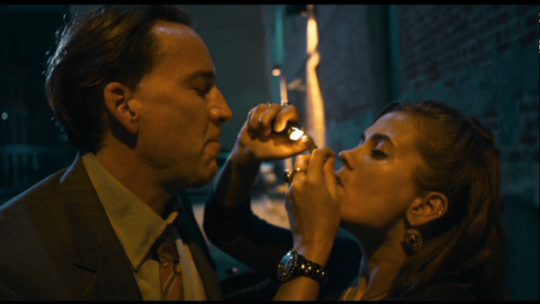
Above all, though, we have the enchanting interplay between three distinct voices: Herzog, Cage, and Finkelstein. The three operate as something of a jazz trio— Finkelstein keeps time while Herzog and Cage solo over his material. Each player takes turns taking control of what’s on screen. Cage brings the Tourettic outbursts of a repressed superstar unchained. Herzog injects the film with lyrical (and often very goofy) interludes. And Finkelstein gives contrast to his partners’ more self-indulgent noodling. Together, the three don’t exactly harmonize; their agendas clash on the screen, birthing moments of wondrous strangeness. You either dig the contrapuntal pleasures, or you hear nothing but noise.
This piece focuses on the film’s noisiest moments: those flashes of improvisation and left-field obsession smuggled into Bad Lieutenant. I select four scenes where the film erupts into delicious chaos. These are the scenes where a genre picture, penned by an industry veteran, morphs into a kind of madness no screenwriter could dream up.
—
“You’re the fucking reason this country’s going down the drain!”
A police officer investigates a homicide while battling his own demons. Bad Lieutenant, for all its digressions, hinges on a fairly straightforward premise. As the film’s tagline cutely puts it, the only criminal Lt. Terence McDonagh can’t catch…is himself. Our protagonist stumbles around New Orleans, getting into all kinds of trouble, as he gathers evidence against the likely perp, a local drug dealer named Big Fate (Xzibit). McDonagh has shades of the great stoner detectives—The Dude, Doc Sportello, Altman’s Philip Marlowe—only he doesn’t shy away from conflict; he seeks it out like a commuter with low blood sugar.
His biggest meltdown arrives in a luxury nursing home. McDonagh’s there to interrogate Binnie, a nursing home assistant, on the whereabouts of her grandson. In the script, he badgers Binnie and a patient in her care, an elderly woman in a wheelchair. Binnie refuses to talk—until McDonagh cuts off the patient’s oxygen supply. Aghast, Binnie gives up her grandson’s location. McDonagh reattaches the oxygen tubes, having extracted the information he needs to move the plot forward, and leaves. End scene.
This two-page exchange runs a sadistic three minutes in Bad Lieutenant. The unscripted touches start right away: Cage hides behind the old lady’s bedroom door as she enters, surreally shaving with an electric razor. He attacks this material with the whisper-or-scream volatility of his famed freakouts. Dialogue-wise, he sticks to Finkelstein’s words for the first two minutes, drawing out lines like “Children…were executed” for maximum menace. From there, he transforms the moment into macabre humor. Cage introduces a gun into the scene, shoving it up against Binnie’s temple as he fumes, “Where the fuck is he?” Once he gets his answer, Cage extends the scene with a virtuoso verbal assault on the old lady. “Maybe you should drop dead you selfish cunt!” he erupts after a few seconds of silence.
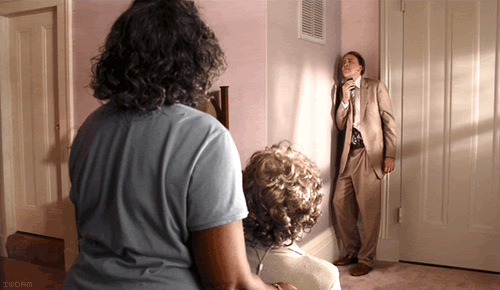
It’s too much to print here in full. You can find it in any Nic Cage supercut worth your time.
“You’re the fucking reason this country’s going down the drain!” he screams to close the scene, a head-spinning non-sequitur from a character who’s never expressed concern for the state of the nation.
For Finkelstein, the scene was way too much.
“When I first saw it I thought, ‘Wow, we can’t do this,’” he said. “‘This is terrible. It’s so extreme. It takes us out of the scene.”
Finkelstein wrote the sequence as an homage to the 1947 noir Kiss of Death, in which Richard Widmark shoves a woman in a wheelchair down a flight of stairs. He saw an early cut of the film and dined that night at Herzog’s house. He decided, rather than suggest a dozen small edits, he would focus on two or three big asks. This scene was one of them. Cage’s assault serves no real purpose. It’s just a full minute of over-the-top Cage rage. I’d imagine most writers would question the inclusion of such a tone-shattering addition to their script. Herzog overruled him.
“I saw it again at the premiere, and I’m sitting there in the theater and I just loved it,” Finkelstein said. “I thought it was funny as hell. The extreme nature of the annunciation is what sold it. I think I was a little conservative, a little cautious.”
“I was so happy that nobody listened to me in the end,” he said.
—
“What’re these fucking iguanas doing on my coffee table?”
Little can prepare first-time viewers of Bad Lieutenant for the iguana interlude. In perhaps Herzog’s most ostentatious addition to the script, he stretches less than a page of script action here into two minutes of on-screen delirium. It’s the film’s most infamous scene, a narrative and aesthetic sideswipe of the highest order.
On the page, the moment unfolds without much incident. McDonagh arrives in an apartment being used to surveil a drug dealer. He has a routine exchange with two officers about the suspect’s whereabouts. McDonagh and Stevie (Val Kilmer) disagree about whether to call the SWAT team. Soon, all five cops leave to apprehend the suspect. No outbursts, no obscenities, no iguanas.
In the film, Herzog opens this sequence with a shot of Cage snorting heroin in a bathroom stall. This bit appears elsewhere in the script; Herzog moves it here, we can presume, to prime us for the psychedelic journey to come.
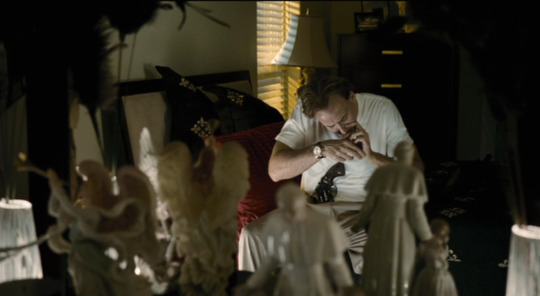
Cage enters the surveillance site with an un-holstered gun comically bulging out of his pants. Finkelstein was on set the day Cage decided to wear his gun like this throughout the film. Initially, he felt compelled to protest.
“There’s times when an actor wants something like this, and you got to say no,” Finkelstein said. Having worked on cop dramas for decades, he took pride in getting these details right.
“Cops don’t carry their guns like that,” he said. “But as extravagant as this was as a gesture, Nic understood something about this character. He was playing this guy bigger than I’d imagined, but in fact he was right and I was too cautious.”
Heroin in his veins, gun in his groin, Cage storms into the scene and spots two iguanas matter-of-factly lounging on a coffee table. He stutters in extreme agitation, turning script lines like “Let ’em stay there” to “Naw! No…just no SWAT, let ’em stay there.” He then drifts into a fugue state with the invisible iguanas. Amid a story of cops and criminals, Herzog asks us to stare at garish close-ups of the animals for 60-some seconds. Louisiana native Johnny Adams wails on the soundtrack. To make the narrative rupture even more pronounced, he films the ordeal in ugly, consumer-grade digital video.
I’m not so concerned with what this all means. Animals and nature have long fascinated Herzog, from the “fiendish stupidity” of chickens to the “obscene, explicit malice” of the jungle. Animals permeate Bad Lieutenant—fish, iguanas, gators—and almost all of them were introduced by Herzog. As a viewer, a part of me wants to rationalize these moments. Perhaps Hurricane Katrina’s floodwaters brought the wilderness into the city, turning New Orleans into a literal asphalt jungle? Or maybe it’s more intuitive: “There is nothing more wondrous,” Herzog has said, “than seeing Nicolas Cage and a lizard together in one shot.”
Finkelstein gave his blessing for the iguana hallucination, despite its total disruption of the story. The scene came at the expense of an action sequence Finkelstein had written. In the shooting screenplay, Cage’s character has a coke-fueled fight with some strangers at a gas station. Herzog refused to shoot the scene to ensure his iguanas made the final cut. Finkelstein tried to sell him on the merits of the rest stop melee, and lost.
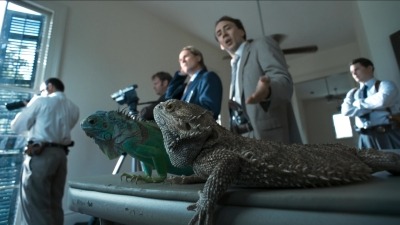
“Herzog said ‘I think we’re going to go long, and then [the producers] are going to make me lose my iguanas—and if they make me lose my iguanas I feel like I can’t be a filmmaker anymore,’” Finkelstein recalled. “And I thought ‘Whoa, this cat is serious. He’s not fucking around.’ I just had so much respect for him as an artist. I didn’t give a good goddamn if he shot the scene or not once he said that. That beats anything.”
—
“To the break of daaaawn, baby!”
Bad Lieutenant’s script detours tend to arrive at the start or end of a given scene. Consider the above examples: Herzog and Cage hit the scenes’ narrative beats, and then they start riffing. As Finkelstein put it, the two “always knew what had to happen in the scene.” Once they hit those notes, they had carte blanche to treat the script like mere bullet points to a freeform lecture of their choosing.
“Nicolas knew that sometimes after a scene was shot I would not shut down the camera if I sensed there was more to it,” Herzog wrote in 2009. “I simply would not call ‘cut’ and leave him exposed and suspended under the pressure of the moment.”
The film’s catchphrase grew from this loose set dynamic. Toward the end of Bad Lieutenant, Cage’s character cons Big Fate to both gather evidence against him and score some of his drugs. In the script, McDonagh, Big Fate, and his men share a moment together after a successful drug deal. McDonagh demands his cut of the money and a cut of the drugs. He pulls a gun on Big Fate and wins the exchange, closing the scene with an unambiguous threat to a car full of drug dealers: “I’ll kill all of you.”
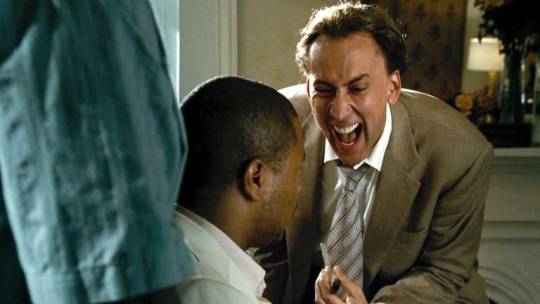
Cage doesn’t end the scene there. To begin, he colors the exchange with spastic ad libs like “Sup!” to get the men’s attention. The actors stray from the particulars of the screenplay, but they convey all the key information to move the story forward. Then the scene trails off into loopy nonsense. Cage waves his gun around like a toy and, sensing radio silence, mutters—and then roars—“I’ll kill all of you…to the break of dawn. To the break of daaaaawn, baby!”
You can see the smirk sneak onto Cage’s face just before he opens his mouth. Clearly pleased with himself, he delivers the line with the Elvis-like drawl he used in Wild at Heart. All four actors erupt in laughter, and suddenly it’s as though we’re watching a closing credits gag reel. Cage swings the mood from sinister to silly; Herzog, the enabler, lets him get away with it.
“This was pure Nic,” Finkelstein said. “That was one of my favorite moments because he can’t help but get this smile on his face when he says it. He’s so enthused.”
I smiled, myself, upon hearing this. As a viewer, I’d long wondered if Finkelstein found moments like this offensive. Here’s Cage, after all, undercutting his words, cracking up fellow actors for kicks. It could be interpreted as mockery. For Finkelstein, though, Cage’s untethered rambles “all seemed to work of a piece.” Finkelstein had years of experience making on-set changes to other writers’ scripts as a TV showrunner. His words, he told me, need not be “cherished” by an actor struck with inspiration.
“The story felt like it could incorporate all that,” he said. “There was a basis for it because this guy was fucked up all the time.”
—
“Shoot him again…his soul is still dancing.”
The script revisions get downright operatic by the film’s climactic shootout. Over an eternal five and a half minutes, Cage and Herzog here transform the script’s most violent moment into a surreal and comic medley of their wildest impulses.
They make far too many edits to detail them all. In Finkelstein’s text, the scene begins as a meeting between Big Fate, his henchmen, and McDonagh. Spirits high, McDonagh smokes crack with the men to test out their new product. He proposes that, in lieu of his cash payment, he gets a cut of the dope. The men agree, and McDonagh spoons his share into a baggie. He then invites Big Fate to take a hit from his “lucky crack pipe.” McDonagh, we later learn, will plant the pipe at a crime scene to seal his case against Big Fate.
A trio of thuggish debt collectors arrives at Big Fate’s home to shake down McDonagh for the money he owes them. McDonagh suggests they take his dope as payment; the head gangster, Dave, threatens to take all of the dope, Big Fate’s included. A tense moment follows. The debt collectors reach for the dope on the table; Big Fate and his men shoot all three of them. “Clean this shit up,” Big Fate says to close the scene.
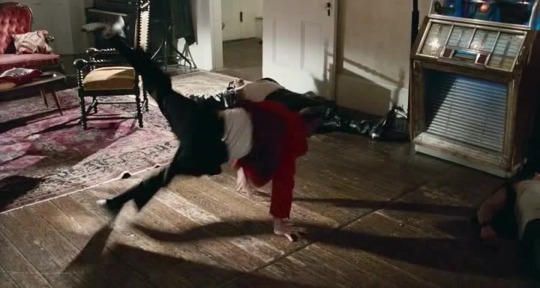
Cage and Herzog’s gonzo take on this material is at once faithful and ludicrous. The scene begins, as in the script, with the characters in a celebratory mood. The four men smoke as Xzibit orders his men to “light the Caucasian’s rock”—the first of many ad libs smuggled into the scene. For Cage, the drugs are a green light to go berserk. He proposes a business idea and explodes into a pipe-bursting laugh few on this earth could imitate. From there, the floodgates open. Cage runs through a nonsense story about a football player who sprouts antlers. We’ve all been there: loaded, desperate to tell a story with no point. Wild-eyed and blissed-out, he ends the unscripted monologue with another abrasive laugh. Pure Cage, uncaged.
Xzibit and his men worry Cage might die from the crack intake. Here, the actors use snippets of Finkelstein’s dialogue about other drug users dying and apply it to Cage, given how feral he’s decided to play the scene. “Easy, easy, easy…cuz I’m not Eazy-E!” Cage retorts, another improv line that makes Xzibit laugh.
From there, the scene plays out as written for two minutes. Finkelstein, a native New Yorker with an agreeably gruff voice, plays Dave, the lead debt collector. The confrontation between him, Xzibit, and Cage ends in a shootout set to “Lost John,” the same song Herzog used for the dancing chicken sequence in Stroszek.
Cage then passes the freak flag to Herzog. Instead of “clean this shit up,” Herzog has Cage implore the gangsters to shoot Finkelstein again because “his soul is still dancing.” Cage erupts into his asthmatic laugh as Herzog pans to reveal a breakdancer dressed like Finkelstein spinning near his dead body. Cage stares ahead, transfixed by the breakdancing soul. An iguana saunters through the room, an emblem of his hallucination. A shootout has devolved into a freakout.
None of this, of course, was scripted. It’s all too perfect: A screenwriter gets his work butchered, and then he gets killed on camera. Finkelstein called these edits “happy bastardizations.”
“Some of that big shootout was improvised, yeah,” he said. “That thing about the gazelle sprouting antlers, Cage made that up. The breakdancing was Werner. Absolutely Werner.”
Finkelstein compared Bad Lieutenant to other gangster films freed from the shackles of genre, from Breathless to the crime dramas of Jean-Pierre Melville. He also likened it to Cop Rock, a short-lived ABC show he co-created. A true curio, the 1990 show operated as part cop drama, part musical. It was a fascinating, supremely awkward marriage. “Audiences were not happily startled,” as Finkelstein put it. Though he didn’t write it that way, Bad Lieutenant became a similar experiment in police procedural storytelling.
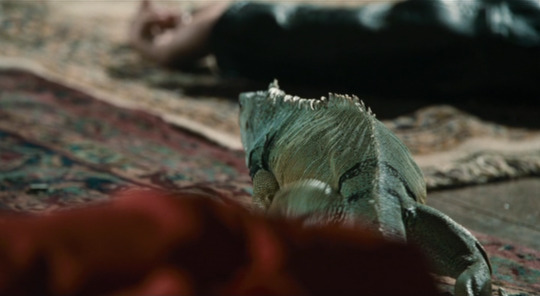
“There’s a tradition of being able to take the form and blow it up and make a movie that’s more lyrical and not realistic,” he said. “I think that’s what we all wound up doing.”
—
Who captains this ship? The answer changes from scene to scene, shot to shot, line to line. A big-name actor, an art-house iconoclast, and a veteran TV writer each take turns steering. Finkelstein guides much of the first act; his instincts as a successful writer/producer orient viewers into this world. Herzog takes the film on its strangest journeys, refashioning this material into an exploration of what he calls “the bliss of evil.” And Cage grabs the mic like a drunk wedding guest, holding viewers hostage to his artful, overlong eruptions. Each contributor has his marquee moments. Like a stoner pizza topped with cream cheese, bacon, and Nutella, it shouldn’t work—but it does.
Bad Lieutenant reveals cinema for what it is: a messily collaborative medium. Every film is the work of many voices. What makes the film wonderful is that, despite their strong and distinct personalities, Cage, Herzog, and Finkelstein’s voices don’t compete; they complement. They produce a sound neither could create on his own.
Finkelstein stressed this point throughout our talks. His impulses did, at times, conflict with the liberties taken to his work. He returned several times to Cage’s unhinged attack in the nursing home. Finkelstein’s voice, calibrated over decades on television, couldn’t make sense of such excess. Of course he came around. Had he been in charge that day, though, he “almost assuredly would have pulled back,” he told me. “That Nic didn’t is a testament to one of the joys of a collaborative process.”
The word “alchemy” feels appropriate for a film this volatile. To watch Bad Lieutenant is to witness a bizarre and unlikely combination of elements collide on a screen. We’ve seen these elements before, in isolation: Cage’s tantrums, Herzog’s lyricism, Finkelstein’s cop drama chops. Together, they produce something new, unclassifiable—a drug you’ve never taken before. As with all great cult films, my recommendation comes with a warning: Be careful. It’ll mess with your head.
